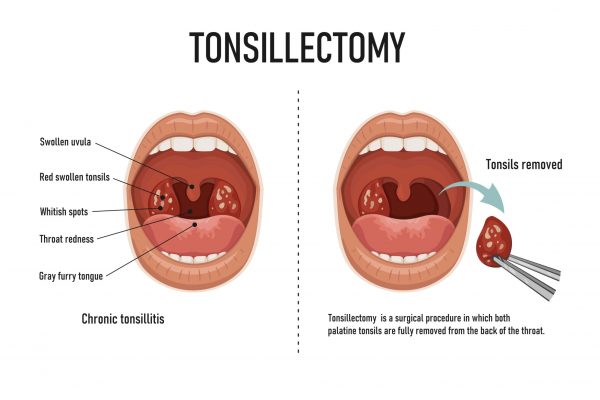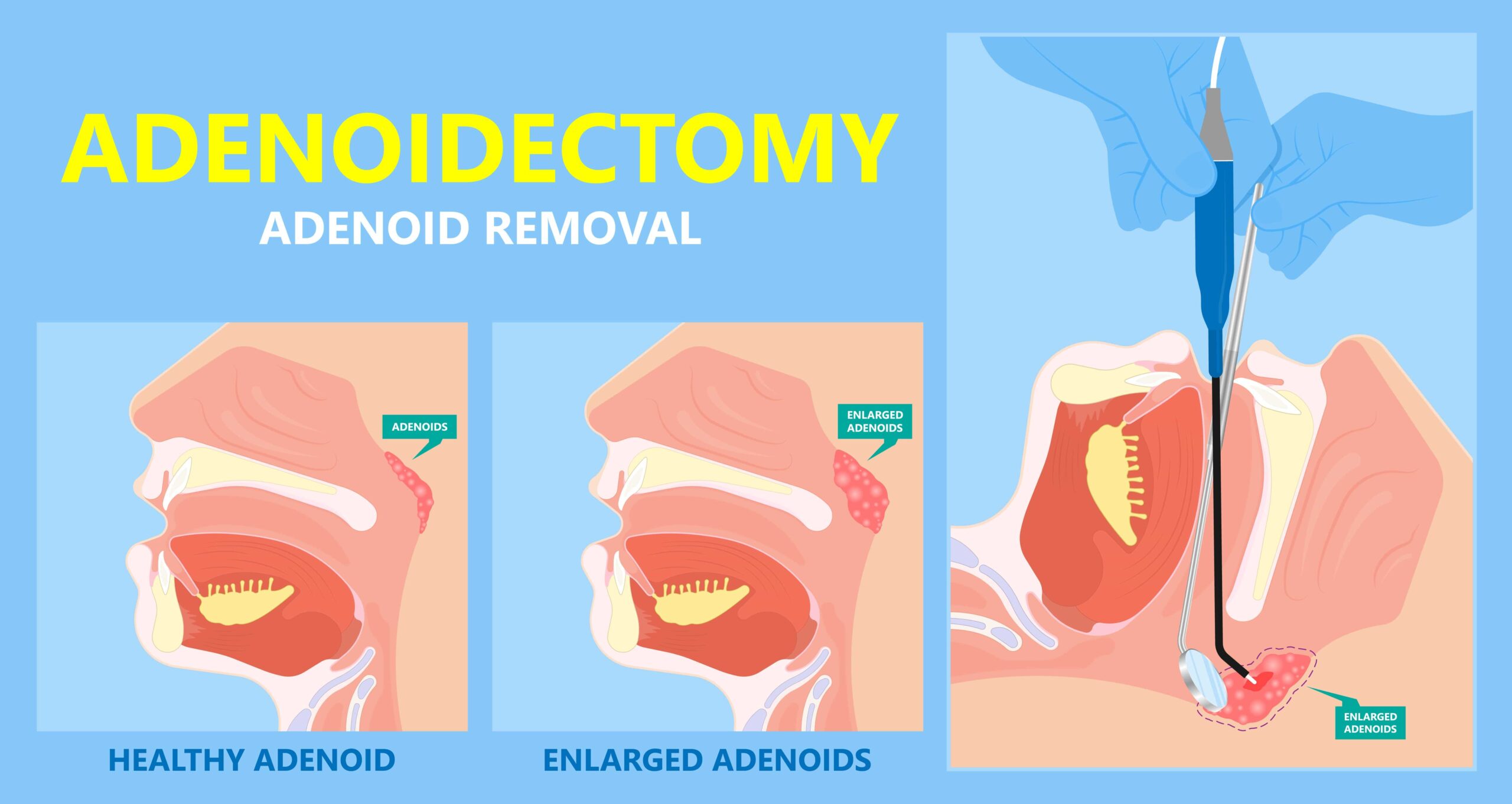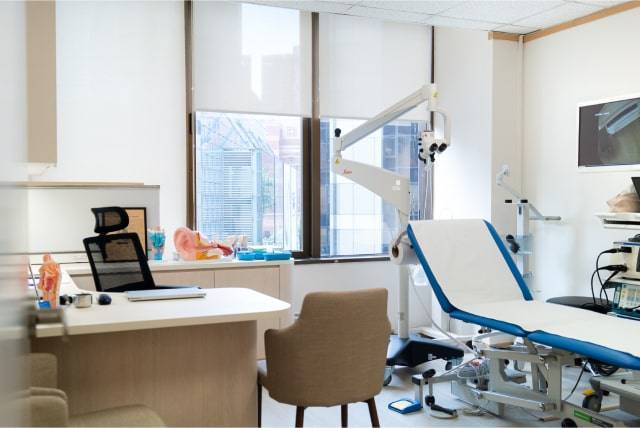Tonsillectomy and Adenoidectomy


Tonsillitis and adenoid infection can occur at any age, they are particularly common among children. For children who experience frequent infections and do not see improvements with conventional medications, their ENT specialist may recommend tonsillectomy and adenoidectomy. Often, these procedures are performed simultaneously and are referred to as T&A.
What are Tonsillectomy and Adenoidectomy?
Tonsillectomy and adenoidectomy are surgical procedures to remove enlarged tonsils (small, round tissues at the back of the throat) and adenoids (similar tissues located at the back of the nose). While these tissues play a role in fighting infections, they can become enlarged and inflamed (a condition known as tonsillitis or adenoiditis) due to frequent infections or may naturally be enlarged from birth.
As a general rule, children who experience frequent infections, 3 or more throat infections per year, may require surgical intervention. At Aglow ENT Centre, our experienced throat specialist can help determine if a T&A surgery is beneficial for your child, particularly if their infections cause functional problems such as obstructive sleep apnoea (disrupted sleep due to pauses in breathing), trouble swallowing, or breathing difficulties.
In order to help you and your child feel confident and well-prepared for the surgical procedure, our experienced ENT specialist will help you thoroughly understand the benefits and potential risks. She will walk you through what to expect during the surgery. Typically, the procedure is conducted through the nose and mouth so there are no visible cuts on the face or neck. Most of the time, it’s performed on an outpatient basis, but an overnight stay might be necessary depending on your child’s specific condition.
Who can perform Tonsillectomy and Adenoidectomy?
A tonsil and adenoid removal surgery is performed by an ENT specialist who is focused on treating conditions related to the ear, nose and throat. Sometimes, you may be referred to an ENT specialist by your general practitioner if they notice a potential issue with your child’s tonsils or adenoids.
In Singapore, you can visit Aglow ENT Centre, led by Dr Ker Liang, who is an experienced ENT specialist and surgeon. With a focus on a personalised treatment approach, Dr Ker Liang is committed to building a strong relationship with her patients from all age categories, including her paediatric patients.
What to Expect
Understanding what to expect before, during and after a T&A procedure can greatly build you and your child’s confidence in undergoing the surgery. At Aglow ENT Centre, our team is here to support you every step of the way, starting with the following tips.
Before the Surgery
Prior to the surgery, you will need to book a consultation with an ENT specialist to assess their present condition. During this stage, your child may undergo some tests before proceeding with the surgery.
This consultation is a crucial opportunity for you and your child’s ENT specialist to address the following preparations:
- Review your child’s medical history, including current or previous medications. Your doctor may advise you to pause certain medications in preparation for the surgery.
- Plan when your child should stop eating and drinking before surgery. This usually means stopping eating at midnight the night before and refraining from drinking until 2–4 hours before the surgery.
- Prepare how to care for your child before and after the surgery. Leading up to the procedure, your child must be in good health to proceed.
You should also use this session to clarify any questions you may have before the surgery.
A T&A usually takes between 30 to 45 minutes to complete. Hence, you will also need to prepare for taking your child home and preparing the necessary care at home. Your child may need to be warded for further monitoring on a case-by-case basis.
During the Surgery
The surgery starts with the administration of general anaesthesia, which ensures your child will be asleep throughout the procedure. The ENT surgeon will then proceed to remove the tonsil and adenoid through the mouth, ensuring no cuts are made on the facial skin.
Your surgeon may employ any of the following techniques that are appropriate for your child’s condition:
- Cold dissection – The affected tonsil and adenoid are cut from the muscular layer attached to it.
- Diathermy – Heat is directed to the tonsil and adenoid to stop bleeding when necessary.
- Coblation – Radiofrequency energy is used to dissolve the tonsil and adenoid.
After the Surgery
After the surgery, your child will be moved to the recovery room for close monitoring. It may take some time before they wake up from anaesthesia. Your child will be permitted to go home the same day if his or her vital signs show positive signs of recovery.
Some things to note after surgery:
- Pain: It is normal for your child to experience a sore throat for the first 2 weeks. The worst pain is usually in the first 5-6 days after surgery. Your doctor will provide you with the necessary prescription for pain management at home.
- Hydration: You will need to ensure your child is well hydrated to lessen the pain. Do not give them milk, orange, or other citrus juices while in recovery.
- Diet: Feed your child soft food and avoid spicy food after surgery. Most children can start eating normally 2 weeks after their surgery.
- Wound Care: It is also normal to see scabs at the back of your child’s throat after surgery. They will likely fall off on their own a week after surgery.
- Follow-up Appointment: Make sure to schedule your next appointment with your surgeon to check on your child’s recovery progress.
The Benefits of Tonsillectomy and Adenoidectomy

Patients who have undergone a T&A usually benefit in the following ways:
- Reduction in Throat Infections: Removing the tonsils and adenoids helps decrease the frequency of infections like tonsillitis and strep throat.
- Fewer Ear Infections: Removal of the adenoids often helps reduce the occurrence of ear infections, which are commonly associated with blocked ear canals.
- Enhanced Quality of Breathing: Removing enlarged tonsils and adenoids opens the airway, making it easier for the patient to breathe, especially at night or during sleep.
- Enhanced Quality of Sleep: Children suffering from sleep apnea due to obstructed airways may experience enhanced sleep quality after surgery.
- Reduction in Snoring and Sleep-related Issues: This surgery can help alleviate issues like snoring or pauses in breathing during sleep.
What is the Success Rate of Tonsillectomy and Adenoidectomy?
Tonsillectomy and adenoidectomy are generally regarded as effective measures to improve obstructive sleep apnoea in children, with most patients experiencing improvements after the surgery. It is also the most common surgery performed on children and is well-known for its safety.
What are the Potential Risks and Complications of Tonsillectomy and Adenoidectomy?
As with any surgery, there are potential side effects. In the case of a T&A procedure, some children may experience the following common side effects: sore throat, ear pain, voice changes, bad breath, snoring and white patches in the throat. Rest assured, these usually resolve on their own.
Although these potential side effects may sound daunting, it is important to weigh the pros and cons of the procedure. Leaving conditions such as repeated infections or obstructive sleep apnoea untreated could lead to severe health complications for your child in the future.
When in doubt, our dedicated paediatric ENT specialist at Aglow ENT Centre is ready to provide close guidance, providing optimal surgical treatment for your child.
When is Tonsillectomy and Adenoidectomy Necessary?
If you or your child is frequently battling an infection like tonsilitis or adenoiditis that causes pain in the throat and difficulty breathing, promptly consult an ENT specialist in Singapore to find an effective solution.
For tonsillitis and adenoiditis treatment in Singapore, book an appointment with our ENT specialist, Dr Ker Liang, at Aglow ENT Centre. Dr Ker Liang sees adults and children for general ENT conditions and provides comprehensive management in a broad range of Ear, Nose, and Throat, as well as Head and Neck conditions. She has a special interest in treating throat and voice conditions, including frequent throat infections, persistent sore throat, voice issues, snoring, and Obstructive Sleep Apnoea (OSA).
Frequently Asked Questions
What is the best age for tonsillectomy and adenoidectomy?
There is no ‘best age’ for a tonsillectomy and adenoidectomy, as it depends on your child’s condition and the ENT specialist’s assessment.
How soon can you eat after the surgery?
Stick to soft, non-irritating foods and gradually return to a regular diet as your comfort improves. Avoid hard, crunchy, spicy, or acidic foods until your throat has healed.
Should I remove my child’s tonsils and adenoids?
This will depend on an ENT specialist’s recommendation. However, if they cause your child medical issues, it is worth considering removal.
Can tonsil and adenoids grow back?
Tonsils and adenoids generally don’t grow back after being removed.
Do people without tonsils get sick more often?
No, some children get fewer infections after a tonsil removal surgery.
Does removing tonsils change your voice?
That is unlikely to be the case. If there’s a change to your child’s voice, it is usually temporary and will resolve on its own.
Medical Teaching
Assistant Professor Ker Liang has a passion for teaching and is an Assistant Professor with NUS Yong Loo Lin School of Medicine (YLLSOM). As the NUS-NUH Otolaryngology Department Undergraduate Medical Director, Dr Ker Liang supervises the training of medical students from YLLSOM, NUS. She is actively involved
in the training of postgraduate junior doctors and residents in the Head and Neck Surgery department. She was conferred with an Undergraduate Teaching Award by the National University Health System in 2016 for her outstanding efforts as an Otolaryngology educator.
Medical Teaching
Assistant Professor Ker Liang has a passion for teaching and is an Assistant Professor with NUS Yong Loo Lin School of Medicine (YLLSOM). As the NUS-NUH Otolaryngology Department Undergraduate Medical Director, Dr Ker Liang supervises the training of medical students from YLLSOM, NUS. She is actively involved
in the training of postgraduate junior doctors and residents in the Head and Neck Surgery department. She was conferred with an Undergraduate Teaching Award by the National University Health System in 2016 for her outstanding efforts as an Otolaryngology educator.



